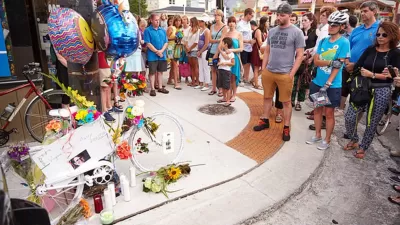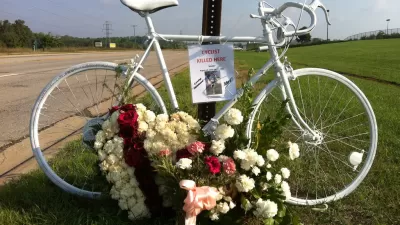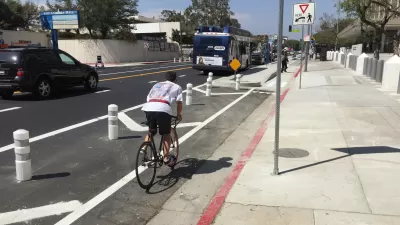The circumstances surrounding the deaths of five bicyclists and injuring of four in June by a motorist on a rural road outside Kalamazoo, Michigan, were so horrendous that it caught the attention of the National Transportation Safety Board.

The investigation marks only the second time in it's 90-year history that the independent federal agency will prepare a report on a bicycle crash. Another reason given for the investigation was "the growing popularity of bicycling as an alternative to vehicles."
The June 7 tragedy on the rural, two-lane North Westnedge Avenue a few miles north of Kalamazoo in Cooper Township, Michigan resulted in five counts of second-degree murder and four counts of reckless driving against the 50-year-old pickup driver who hit all nine, experienced cyclists from the rear, by far the most common type of bicycle crash according to a chart [PDF] by the League of American Bicyclists. [See study (PDF)].
"NTSB spokesman Eric Weiss said in June the team will look at all aspects of the incident, including how it happened and how the truck hit the bicyclists," reports Emily Monacelli for the Kalamazoo News (via MLive.com).
He said the team will reconstruct the crash and find out if there are any safety issues that could be improved, from the vehicles involved to the road.
In our June 21 post on the incident, Toole Design Group engineer "Bill Schultheiss and Jim Ferner, Kalamazoo biking advocate, said widening the shoulders on Westnedge to give bikers a separate lane should be the first priority to increase safety." It also noted "that while there has been progress in improving bike infrastructure on urban roads, it's difficult to make changes on rural roads."
Weiss said the NTSB took an interest in the case and investigating it, and that it wasn't the request of local authorities.
This is such a singular event that we wanted to look at the issues behind it," said Weiss, who acknowledged it's unusual for the NTSB to investigate crashes involving bicycles.
In addition to the above charges, the driver, "Charles Pickett Jr. is accused of five charges of operating while intoxicated causing death," reported Monacelli earlier. "Pain pills and muscle relaxers" may have been the cause of his driving impairment. NTSB will investigate their role in the crash.
A preliminary NTSB report posted online Aug. 3 "does not provide much more detail than many media accounts," reports Fredrick Kunkle for The Washington Post. "But the NTSB’s interest in a bicycle accident is unusual."
“We last looked at cycling in the early 1970s,” NTSB spokesman Eric Weiss said in an email [Aug. 9.] “We’re looking at the Kalamazoo crash as part of an effort to examine the future roadway, where cars and trucks increasingly share the road with cyclists and pedestrians.”
The agency decided that the crash was worth investigating not only because of its severity but because of the growing popularity of bicycling as an alternative to vehicles.
According to the agency's website, "The National Transportation Safety Board is an independent Federal agency charged by Congress with investigating every civil aviation accident the United States and significant accidents in other modes of transportation – railroad, highway, marine and pipeline."
Correspondent's note: The NTSB investigation into the crash was noted earlier in "Traffic Safety Advocates Taking Action Into Their Own Hands."
Hat tip to The AASHTO Daily Transportation Update
FULL STORY: NTSB issues preliminary report in fatal Kalamazoo bicycle crash

Planetizen Federal Action Tracker
A weekly monitor of how Trump’s orders and actions are impacting planners and planning in America.

Map: Where Senate Republicans Want to Sell Your Public Lands
For public land advocates, the Senate Republicans’ proposal to sell millions of acres of public land in the West is “the biggest fight of their careers.”

Restaurant Patios Were a Pandemic Win — Why Were They so Hard to Keep?
Social distancing requirements and changes in travel patterns prompted cities to pilot new uses for street and sidewalk space. Then it got complicated.

Platform Pilsner: Vancouver Transit Agency Releases... a Beer?
TransLink will receive a portion of every sale of the four-pack.

Toronto Weighs Cheaper Transit, Parking Hikes for Major Events
Special event rates would take effect during large festivals, sports games and concerts to ‘discourage driving, manage congestion and free up space for transit.”

Berlin to Consider Car-Free Zone Larger Than Manhattan
The area bound by the 22-mile Ringbahn would still allow 12 uses of a private automobile per year per person, and several other exemptions.
Urban Design for Planners 1: Software Tools
This six-course series explores essential urban design concepts using open source software and equips planners with the tools they need to participate fully in the urban design process.
Planning for Universal Design
Learn the tools for implementing Universal Design in planning regulations.
Heyer Gruel & Associates PA
JM Goldson LLC
Custer County Colorado
City of Camden Redevelopment Agency
City of Astoria
Transportation Research & Education Center (TREC) at Portland State University
Camden Redevelopment Agency
City of Claremont
Municipality of Princeton (NJ)





























